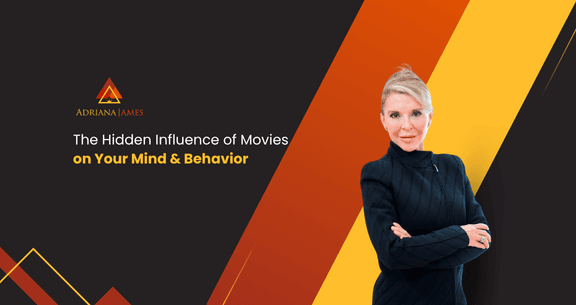By Dr. Adriana James
The other day, a good friend asked me a question that many parents, teachers, and even mental health professionals should consider:
“Do movies have an influence on your children?”
My answer? Absolutely—without a doubt.
Not because movies are inherently bad, or because watching one will immediately change who you are, but because of the way our minds process what we see on screen. Movies, whether we realize it or not, are powerful vehicles for suggestion. Films are powerful vehicles for unsconscious suggestion. They can bypass our conscious thinking, speak directly to our unconscious mind, and—over time—shift our behavior, beliefs, and even our emotions.
In this article, I’ll walk you through how movies affect the unconscious mind, why this matters for children and adults alike, and what you can do to protect yourself and your family from unwanted influence.
How Movies Bypass Your Critical Thinking
When we talk about how movies influence us, we have to understand the two main parts of the mind:
- The Conscious Mind – This is your logical, reasoning part of the brain. It analyzes, compares, judges, and decides what to accept or reject.
- The Unconscious Mind – This runs automatic behaviors, stores your beliefs, and governs emotional responses. It accepts information at face value without reasoning it out.
In hypnosis, we work directly with the unconscious mind to create change. Here’s the catch: movies can do something similar without you even knowing it.
When you sit down to watch a film, you knowingly suspend your disbelief. You pretend that what you’re watching is real so you can enjoy it. You allow yourself to imagine the film’s reality so you can engage emotionally.
During those two hours, your critical faculty – the filter distinguishing fantasy from reality – is lowered. While you still “know” it’s fictional, your unconscious is more open to suggestions.
And in that state, anything in the movie—products, behaviors, fashions, or ideas—can slip in without your awareness.
We teach practical tools to protect your mind in our 3-Day Hypnosis Training.
Why Advertisers (and Scriptwriters) Love This
You’ve probably noticed “product placement” in films—brand names, gadgets, or cars casually integrated into scenes. This isn’t accidental.
Advertisers understand that when your guard is down, you’re more receptive. That sleek silver car you saw in a movie a year ago? It’s not a coincidence you feel familiar with it today.
Movies don’t just sell products. They can normalize new behaviors, trends, and even cultural shifts. What once seemed shocking or unusual can, through repeated exposure, start to feel “normal”.
The Physical Effect on Your Body
Movies don’t just influence your mind—they can also change your physiology.
When you watch a scary movie or an adrenaline-pumping action scene, your body reacts as if it were real:
- Adrenaline surges, making you excited, alert, or even craving more.
- Cortisol spikes during frightening scenes; chronic exposure can harm health.
- Some people become addicted to the adrenaline rush, seeking more intense films for the same hit.
Why This Matters for Children
Children under age 7 are especially impressionable because their critical faculties aren’t fully developed.
I worked with a teenager suffering from chronic nightmares. His parents hadn’t made the connection, but he constantly watched horror films. At a conscious level, he “knew it was just a movie.” But his unconscious accepted the scary imagery as real and replayed it at night in dreams.
We resolved it with Time Line Therapy® and hypnosis, but it could have been avoided if his parents understood how movies directly influence a developing unconscious mind.
The Broader Societal Impact
The same principle applies on a global scale. Over decades, movies have:
-
- Introduced concepts like AI, robotics, and advanced tech before they existed.
- Shifted attitudes toward behaviors, fashion, and values by sheer repetition.
- Desensitized audiences to violence and tragedy by presenting it as entertainment.
When these ideas eventually become reality, people feel a sense of familiarity—even acceptance—because they’ve already “lived” them on screen.
Protecting Yourself and Your Family
Here are three practical ways to reduce unwanted influence:
-
- Be selective – Choose content aligned with your values and desired emotional states.
- Discuss what you watch – Teach children to separate reality from fantasy and uncover hidden messages.
- Take breaks – Avoid long binges of intense, violent, or hyper-stimulating films.
The bottom line?
Movies are not “just entertainment.” They are immersive experiences that influence your unconscious mind, shift emotions, and normalize new ideas—sometimes for better, sometimes for worse.
By watching with awareness, you can enjoy the art form while staying in control of what you allow into your mind.
In Part 2 of this series, I’ll share a practical process you can use to guard your unconscious mind from unwanted suggestions—from movies, ads, or daily media.
If you’d like to go deeper now, discover the 3-Day Hypnosis Training or Hypnosis Trainer’s Training.

